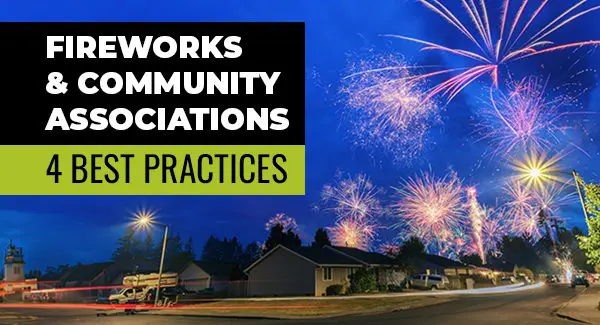- Community Associations, Board Member 101, Seasonal and Holidays
- Wisconsin, Indiana, Illinois, Florida
Fireworks can be a spectacular part of holidays and special event celebrations. However, board members must manage fireworks in their condominium, homeowner (HOA), and townhome community associations, balancing residents’ enjoyment and safety.
Let’s explore several best practices that can help board members effectively navigate fireworks regulations, relevant laws, safety considerations, association rules, and community expectations.
Fireworks Laws and Regulations
The Bureau of Alcohol, Tobacco, Firearms and Explosives (ATF) enforces fireworks laws and regulations. They place fireworks into two categories: display fireworks and consumer fireworks.
Display fireworks are utilized in large displays and are monitored by trained and certified technicians. These displays are coordinated with governing bodies and fire departments and typically require permits and insurance coverage.
Federal law bans many types of fireworks such as M-80s, cherry bombs, along with any firework with more than 50 milligrams of pyrotechnic composition. Unless prohibited by federal, state or local laws, consumer fireworks can be sold to the general public.
Various states also regulate fireworks. For example, the Illinois Pyrotechnic Use Act (“PUA”) addresses “unregulated novelty fireworks” including sparklers, smoke devices, and a variety of trick noisemakers. Violations can lead to a $2500 fine and up to one year in prison.
Rules and Regulations
If the association decides to restrict or allow fireworks, these guidelines should be clearly outlined in the community’s rules and regulations to ensure all residents are aware of what’s permitted.
To avoid potential property damage and liability concerns, board members should consult with their association’s attorney to understand fireworks laws that affect their community and to ensure all policies are fully compliant.
Once established, communicate community policies through newsletters, emails, and community bulletin boards especially around holidays like July 4th and New Year’s. Regular reminders can be helpful, as they reinforce the policy and encourage residents to respect community guidelines, fostering a safer, more enjoyable environment for everyone.
Promoting Safety
For community associations that permit fireworks, encourage safety precautions by providing resources or reminders on proper usage, safe handling, and disposal.
Remind residents to keep a safe distance from buildings, trees, flammable materials and to respect neighbors’ properties.
Insurance and Liability
Board members should also review the association’s insurance policy to ensure proper coverage and consider including a reminder in community guidelines that residents may be liable for any fireworks damage they may cause, including:
- Property damage to roofs, balconies, or exterior walls
- Damage to landscaping (lawns, trees, and shrubs) caused by fireworks debris, heat, or sparks
- Vehicle damage (ex. burns, scratches, broken windows) caused by sparks and debris from fireworks
Community Events
To reduce risks, some community associations choose to host organized fireworks events in designated areas, such as open fields or large communal spaces, where potential hazards are minimized.
These planned events allow residents to enjoy fireworks without the risks associated with individual, unsupervised displays near homes or flammable materials.
Legal Resource
By implementing thoughtful policies and promoting safe practices, community associations can create an environment where residents enjoy fireworks responsibly and safely. Fireworks regulations and safety measures might seem complex, but with clear communication and a proactive approach, board members can reduce risks and enhance the festive spirit during holiday celebrations.
Whether it’s through structured events, safety reminders, or clear rules, associations play a key role in balancing community enjoyment with compliance and safety. With these best practices, board members can confidently navigate fireworks celebrations, ensuring a memorable and secure experience for everyone involved.
Questions about fireworks in your community association? Do not hesitate to call 855-537-0500 or visit www.ksnlaw.com.
Since 1983, KSN has been a legal resource for condominium, homeowner, and townhome associations. Additionally, we represent clients in real estate transactions, collections, landlord/tenant issues, and property tax appeals. We represent thousands of clients and community associations throughout the US with offices in several states including Florida, Illinois, Indiana, and Wisconsin.
Please note the material contained in this article is for educational and informational purposes only and does not constitute legal advice. No attorney-client relationship is established by your review or receipt of the information contained in this article. You should not act on the information discussed in this article without first obtaining legal advice from an attorney duly licensed to practice law in your State. While KSN has made every effort to include up-to-date information in this article, the law can change quickly. Accordingly, please understand that information discussed in this article may not yet reflect the most recent legal developments. Material is not guaranteed to be correct, complete, or up to date. KSN reserves the right to revise or update the information and statements of law discussed in the article law at any time, without notice, and disclaims any liability for your use of information or statements of law discussed on the article, or the accessibility of the article generally. This article may be considered advertising in some jurisdictions under applicable law/s and/or ethical rules/regulations. © 2025 Kovitz Shifrin Nesbit, A Professional Corporation.


